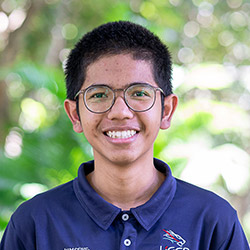
My heart was pumping fast; dup-dup dup-dup. My adrenaline was high. My palms were sweaty. My legs were shaking. I raised my left hand up, holding my air inflator/deflator of my Buoyancy Control Device (BCD, or Buoyancy Compensator, BC). My instructor signaled me a thumbs down; in divers’ language, that means descend or go down. I was filled with both fear and excitement which made me breathe like I just ran a marathon. We all pressed the deflation button at the same time; fssss, the sound of the air exiting our BCD, and there I went underwater.
That was one of the most surreal moments of my life. The moment where I faced my fear- the ocean. Because of my passion for marine biology and conservation, I was committed to doing whatever it takes to help save the “dying jewel” of Cambodia.
Throughout this year, I’ve pushed myself to take risks and to do what I wouldn’t usually do. I was heavily influenced by a quote from Casey Neistat, that goes “The most dangerous thing you can do in life is play it safe.” This is the quote that I lived my year based off. This is the quote that inspired me to be a risk-taking, passionate, curious, and pioneering change agent.
Back in May 2017, the members of Liger Marine Research Team was announced, and I, pleasantly, was one. Even though I know it is a long-term research project about the Cambodian ocean, I wasn’t sure what I just got myself into. My first mission was to get dive certified so I spent my summer taking the Scuba Schools International (SSI) Open Water Diver course. I, then, went to Koh Seh to apply that knowledge into the water. We manage to cramp a course that would usually take three weeks into four intense days of training. The team, then, took courses with Marine Conservation Cambodia (MCC), an organization based on Koh Seh that does conservations and research on the Kep archipelago, to learn the methodology of reef surveys, and to learn about fish, invertebrates, and substrates, and identifying them.
Fast-forward to March, right after the government establishes the Marine Fisheries Management Area (MFMA) in Kep, the LMRT implemented our own artificial reef block that sets off our three-year-long research project. In April, only a month after deployment, we’ve seen a tremendous growth in the fish population. We’ve surveyed and seen 14 new species in the area, which, only in a month, was a sign of success. I went from being scared of the ocean to logging in around 30 dives by the end of the year. I went from being interested in marine biology to be a marine biologist.
Another project that I’ve been involved with was about gender equity and discussing uncomfortable topics that needed to be discussed. From gender issues in advertisement and our economics to gender-based violence, my colleagues and I had been having in-depth conversations about different areas of gender equity. I got to write and publish two articles on the Change for Gender Equity website: “Boys, Cry!” and “Behind the Music: A Look at Female Musicians”. At the end of the 7 weeks project, we had a two-day student facilitated summit that was in both Khmer and English that discussed four topics– power, language usage, economics, and culture– and I was a co-session leader discussing language usage. Pause, let me be honest, I am really afraid of public speaking, and leading these discussions was very challenging. But conversations are really critical in our society, and when it comes to discussing about gender, in both languages but especially in Khmer, there’s a lack of vocabularies or misunderstandings in the language we use to discuss these sensitive topics, and that’s what made me stand up, bring a group of young people together, and discuss this issue. Discussions were had, and tears were shed. More than 100 students showed up and left with knowledge and courage. As one of the session leaders, that was a very impactful event and a satisfying success.
Approaching problems by educating people from a young age is what I believe in; that’s why I worked with seven Liger students, and a group of change agents from an organization called World Renew, to tackle the problem of drugs usage. I joined forces with my colleagues to study the issue, make an educational film, plan workshops and going to five provinces to lead interactive workshops with close to a thousand total highschool students. The workshops include sessions about general information about drugs in the country, the side effects, preventions, and solutions. The students were very engaging with the different discussions we had, and at the end of the day, they are one step farther from drugs.
To me, being a change agent was about rocking the boat, and being the black sheep in the herd. By doing these projects, I was apart of putting the spotlight on these issues, and working out how we will battle them. What I’ve done may seem like a very small fraction of helping with the problem in Cambodia or the world, but if I can make a vivid influence on one person’s life, my goal would be accomplished. If I can make one man cry when in our society, guys were strictly told not to, or make a little boy to say no to drugs when all his friends pressure him to join them, or even save a juvenile fish’s life when using the artificial reef block I deployed to try to get away from a trawler, that’s what I consider a tremendous success.
“I alone cannot change the world, but I can cast a stone across the waters to create many ripples.” – Mother Teresa
